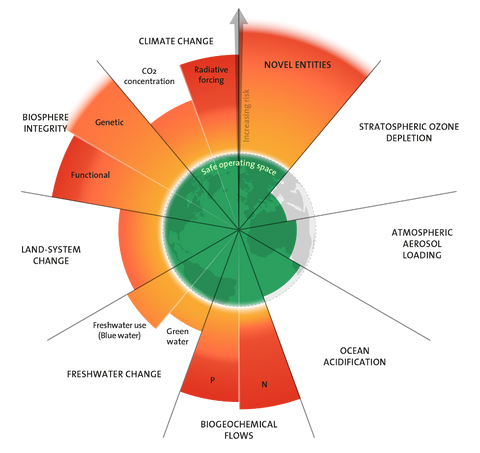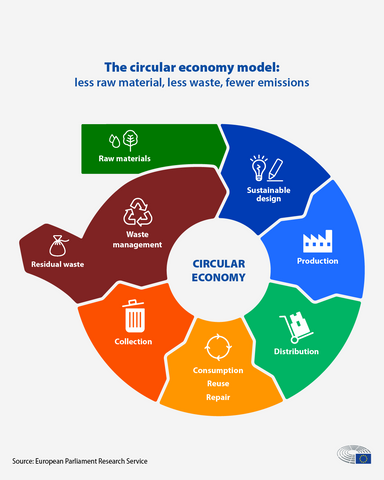Introduction
What does it mean for an economy to be “circular”? Most people are familiar with the phrase ‘reduce, reuse, recycle,’ which is a key component in the idea behind circular economy. To provide a basic definition:
Circular Economy is an economic system based on the reuse and regeneration of materials or products in order to continue production in a sustainable way. It keeps materials in circulation without needing to harm the environment for more and moves away from the “take, make, throwaway” mentality.
Why is it important?
The climate crisis looms over us, and recovering material and keeping it out of landfills is an important part in solving this. The UN stated that extraction of natural resources contribute to nearly half of global greenhouse gas emissions, which is why circular economy is a crucial concept for our future. It has potential to protect the environment, boost economic wellbeing, and keep social justice issues at bay.
“Nothing is lost, everything is transformed” -Antoine-Laurent de Lavoisier
Essentially, the circular economy mimics the Earth’s naturally occurring circular systems. Imagine an orange tree making lots of oranges. It doesn’t take any valuable resources to make the oranges, and then they fall to the ground. Once they’re on the ground, the oranges decompose and become nutrients to feed insects, microorganisms, animals, and more in the ecosystem. Then, it happens all over again. In this way, the tree is able to make an abundance of its product without harming anything else, and it nourishes all around it before it is put back into the system to repeat the circle again.
If humans were to achieve a system similar to the one of an orange tree, then we would be able to sustain not only our consumption, but our economy for years to come without further environmental degradation.
World populations continue to grow, and it is clear now more than ever that our current consumption habits will not be able to last much longer as it continues. The “take, make, throwaway” mentality has depleted the Earth’s resources, and even today around a third of the food produced for humans is wasted. The demand for resources has exceeded the Earth’s capacity since the 1970s. Lifespans of items are getting shorter, while human lifespans are getting longer. We own more stuff for less time. These habits are essentially digging us into our own grave.

Planetary Boundaries: A way to demonstrate how much resources we have available to us if we want to live sustainably and safely, and how much we are currently using. Currently, we are overshooting 6 out of 9 planetary boundaries.
What is stopping us from adopting the circular economy?
Considering how much the circular economy could improve the wellbeing of generations to come, why hasn’t it been implemented yet? The honest truth: It is too expensive. As silly as it sounds, no one wants to fund it because it is not as profitable. And at the end of the day, the people who are capable of implementing it usually care more about profit than sustainability. Measuring the financial benefits of the profitability of circular economy is extremely difficult, and getting people to change their habits and transition to something new has never been easy in any sense. Eventually, we will be forced to pursue it when we slowly run out of resources. And hopefully by that time, someone will step up and decide to lead the pack.
One of the other pitfalls of the circular economy is that technology just hasn’t caught up yet. Sorting through materials for recycling, or being able to recycle certain materials in the first place is still new and changing every day. Most recycled materials cannot be recycled endlessly, maybe only 3 to 4 times. And, most product designs are not made to be the most reusable friendly at the moment. This puts a great barrier in the way of reusability and continuing the circle in the circular economy. The costs to transition equipment towards recycling and reusability is also a large barrier preventing us from already pursuing the circular economy.
Lastly, legislation just has not caught up yet to this idea of circularity. Some barriers will go away with time, while others will require guidelines and governments in order to continue onwards. The EU is a great leader in circular economy legislation, setting ambitious goals and funding along with the Circular Economic Action Plan for the European Green Deal.
Some of these ideas include:
- All plastic packaging in the EU recyclable for 2030
- Landfill reduced to 10% of waste by 2035
- Climate neutrality
- Resource efficiency improvements of 30% by 2030
Adoption of the circular economy will not happen overnight, but governments and industries are slowly starting to recognise its importance and take steps to begin a transition. By rethinking business models, designing sustainably, collaborating for increased value, and strengthening our knowledge on the circular economy, we can do our part to ensure this transition is a smooth one.
What is SR Mailing doing to contribute to the circular economy?
Here at SR Mailing, we are doing our best to ensure we have a closed loop system for our most popular products, and are currently working to implement it.
As of right now, we have a cradle to consumer model for our recycled mailing bags. We collect already used plastic ourselves, process it ourselves, and create our mailing bags for consumers. As of right now, recycling facility access is uncertain in the UK. We do our best to educate our customers on proper end of life disposal for our mailing bags, and hope that in the future we create a type of collection system so we can 100% guarantee they end up back to us for further recycling. But, we have slowly begun the transition. And since we have already taken so many steps, we now have the time to get our system in place and do our best to close the loop before its too late. Check out some of our carbon neutral and recycled products!







